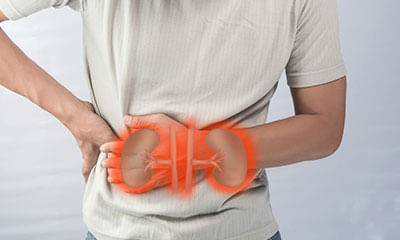Homeopathy: How Work in Chronic Kidney Disorder
Chronic Kidney Disorder Homeopathic Treatment
Homoeopathic treatment:
Homeopathy does not identify kidneys as a simple organ of excretion or selective filtration, but appreciates it in relation to the individual as a whole. Kidneys have a comprehensive role, the fluids coming to it and going from it impinge on every organ, tissue and cell of our body. Homeopathy plays a significant role in long term management at all stages and variants of nephrotic syndrome. The basic approach in homeopathy is to evaluate nephrotic syndrome in its totality, whereby a lot of highlight is given to the patient as a whole besides thoroughly studying various aspects of the disorder. Homeopathic remedies help arrest further progress of the disease and assist in recuperating faster, reduce and eventually stop the need for steroids, reduce duration, frequency and severity of the attacks by regulating the autoimmune processes. The remedies manage the protein leakage, by amending the glomerular function of the kidney. Remedies also uplift the body’s own healing capacity, whereby precluding the frequent infections such as colds, throat infections, etc.
Homeopathic remedies when taken in the preliminary stage of nephrotic syndrome can prevent complications like renal failure, consequently, limiting the option for dialysis in instances, where kidney damage has advanced, homeopathy discourages further progression of the syndrome, and will contribute in reducing the frequency of dialysis, or at times, even eliminate the need for dialysis. Homeopathic approach focuses on a detailed case study, which involves the medical history of the patient, underlying pathology, mental, emotional and spiritual aspect of the patient, family history, personal history, possible causative factors, and much more. The homeopathic focus is not on treating the disease but in healing the person who is sick and in reviving the health. Homeopathic remedies will help enhance the quality of life, by strengthening the immune system of the patient, thus, making them less susceptible to infections.
Hence, homeopathy can skillfully manage symptoms related with nephrotic syndrome. With well-timed homeopathic treatment it may be possible to avoid steroid dependency and kidney failure
Kidneys are two bean shaped organs, positioned at the focal point of our back, on either side of the spinal column, underneath the rib cage. Kidneys work as sophisticated recycling devices, separating urea, mineral salts, toxins and other waste products from the blood. They safeguard water, salts and electrolytes that are essential for the operation of other organs and systems in the body. Kidneys also produce hormones that control red blood cell production, blood pressure and calcium metabolism. Kidneys perform a life sustaining job for the body by maintaining a stable balance of body chemicals. Any malfunctioning in this balance leads to kidney disorders, one of which is nephrotic syndrome (chronic renal disease). Nephrotic syndrome (chronic renal disease) is a forewarning that your kidneys are being damaged.
Nephrotic syndrome (kidney failure) is a multifaceted immunological disorder where there is unusual leakage of protein, prompting low levels of proteins and high levels of fat in blood and swelling of body parts. Nephrotic syndrome is an outcome of damage to the small blood vessels in the kidneys known as glomeruli that strains wastes and surplus water from the blood, and passes it on to the bladder as urine. When the glomeruli are operational, they uphold protein in the blood and avoid leakage into the urine. When damaged, they not execute this role successfully, and 3 grams or more of the protein can escape daily out of the blood. When blood is low in protein, fluid accumulates in tissues rather than circulating, causing puffiness all over the body. Normal amounts of blood protein are essential to help control fluid throughout the body.
Symptoms:
Swelling on the face, around eyes, ankles and feet.
Stomach pain.
Low urine output.
Excessive protein excretion in the urine.
Weight gain from fluid retention.
Muscle wasting.
Loss of appetite.
Frothy urine.
Shortness of breath.
Low or high blood pressure depending on age.
Nutritional deficiencies.
Stunted growth in children.
Hair loss.
Delicate nails.
Blood clotting inside the kidney or excessive bleeding.
Kidney failure.
Shock.
Kidney failure symptoms like sleepless vomiting weight loss bad breadth sore mouth weakness increased urination.
Causes of nephrotic syndrome:
Minimal change disease in children, a kidney disorder triggered by an allergic reaction, viral infection, immunization, etc.
Membranous glomerulonephritis, an inflammation in the kidney.
Strep throat.
Pre-eclampsia, toxemia during pregnancy.
Mononucleosis, an infection caused by epstein barr virus.
Hepatitis, a contagious disease of the liver.
Overuse of non-steroidal anti inflammatory drugs, substance abuse, etc.
Genetic disorders like down’s syndrome, hemophilia, cancers, celiac disease, etc.
Immune disorders like allergies, asthma, diabetes, hypertension, rheumatoid arthritis, etc.
Systemic lupus erythematosus, an autoimmune disorder that affects the skin, joints, kidneys and other organs.
Multiple myelomas, cancer of the plasma cells in bone marrow.
Amyloidosis, a disorder in which protein fibers are deposited in tissues and organs.
Segmental glomerulosclerosis, scarring of the tiny blood vessels in the kidney.
Heart failure.
Kidney failure heart failure oedema na k imbalance in serum.
Self care measure:
Eat enough protein, to replace the protein loss in the urine. However, excessive protein should be avoided, as filtering of surplus protein can cause tubular damage to the kidneys.
Reduce sodium intake to ease the swelling.
Avoid fatty foods.
Avoid caffeine, smoking and alcohol.
Monitor your fluid intake.
Eat more fruits and vegetables.
Garlic, ginger and parsley are strengthening herbs for the kidney.
Self care measure of kidney disease.


+1.svg)
